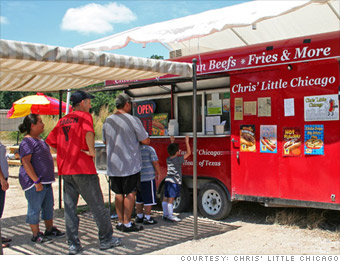Big sales from tiny shops
In kiosks, trucks and other teeny spaces, entrepreneurs with big dreams but little money are shaking up the retail scene.

Chris' Little Chicago
Austin
After selling his Illinois gourmet food store and moving to Austin six years ago, Chris Miller was anxious to open another food-related business. So he became an early pioneer of one of food world's hottest trends: mobile food trucks.
Miller's hot-dog trailer transplants a Chicago classic down south. "I manage the trailer myself with a small crew, keep a close relationship with all my customers -- many I know by first name --and put out a quality product that people really seem to enjoy," Miller says.
He likes the flexibility mobility brings. "If the location ever seems to peter out, I can always hook it up and move to another spot," Miller says.
Plus, low overhead translates to low prices: "I can feed a family of four for around $20."
Why it works: "These venues feel local and intimate at a time when consumers are looking for ways to feel connected to their communities," says Kit Yarrow, a consumer psychologist and professor at Golden Gate University in San Francisco. Yarrow has been studying the micro-business phenomenon.
Like many mobile businesses, Miller's advertises its specials on Twitter and encourages fans to post pictures on Facebook.
"The Internet has changed our perception of 'place,'" Yarrow says. "Virtual identity is as real as an identity created by a physical location."
NEXT: A small island in a big mall
